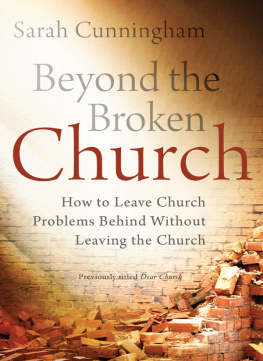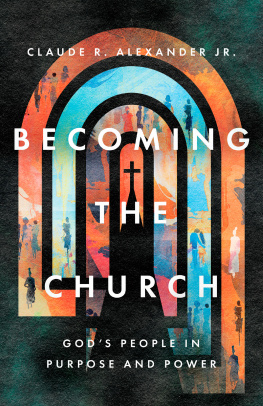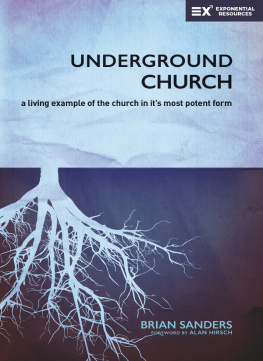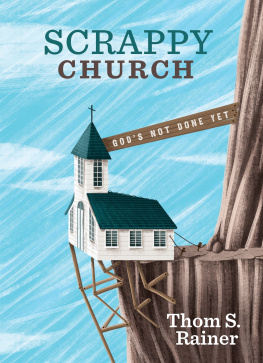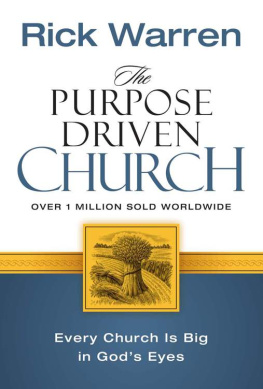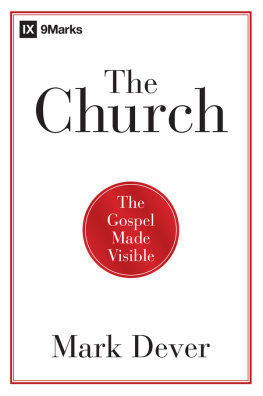Praise forReclaiming Church
With humor and grace, J. J. Warren not only offers a theological lifeline for queer kids but also provides a path to Resurrection for the Church. This book is a reminder of why theology matters and how a little scholarship goes a long way.
Rev. Stephen Cady, Senior Minister, Asbury First United Methodist Church, Rochester, NY
In his deeply personal voice, J. J. Warren courageously calls the United Methodist Church to examine again the distinction between what is often assumed to be its tradition and the deep roots of tradition that have long embraced an inclusive worldview.
Thomas V. Wolfe, President and CEO, Iliff School of Theology
Reclaiming Church is insightful, informative and inspirational. This fresh and personal look at human sexuality and the role of the Church is a must-read and a tremendous opportunity to have a deeper and new conversation with those you may agree with or disagree with concerning human sexuality.
Olu Brown, Lead Pastor, Impact Church
J. J. Warren is no flash in the pan. I, along with many others, first encountered J. J.s powerful voice as I watched a livestream of his impassioned speech on the floor of the 2019 Special Session of the UMC General Conference. Now, in this book, J. J. demonstrates that his speech flowed from a deep well of theological and practical thinking about the nature and mission of the church. J. J. offers a beautiful vision of a truly inclusive church and a clear road map of how those whom the church has marginalized can reclaim their rightful place at the center of the churchs identity and work.
Theodore Hickman-Maynard, Associate Dean for Students and Community Life and Assistant Professor of Black Church Studies, Boston University School of Theology
For people who are passionate about reforming their denomination, J. J. is someone you should listen to. Through passionate storytelling and very accessible theological concepts, he walks readers of all backgrounds toward an idea of Church that not only is appealing but also gives me hope that perhaps that we, the Church, can evolve into the people we always were meant to be. Reclaiming Church gives us a picture of a better church for all of us, straight folks included.
Kevin Garcia, queer public theologian, digital pastor, and intuitive soul coach
Reclaiming
Church
A Call to Action for
RELIGIOUS REJECTS
J. J. Warren

RECLAIMING CHURCH
A CALL TO ACTION FOR RELIGIOUS REJECTS
Copyright 2020 Abingdon Press
All rights reserved.
No part of this work may be reproduced or transmitted in any form or by any means, electronic or mechanical, including photocopying and recording, or by any information storage or retrieval system, except as may be expressly permitted by the 1976 Copyright Act or in writing from the publisher. Requests for permission can be addressed to Permissions, The United Methodist Publishing House, 2222 Rosa L. Parks Blvd., Nashville, TN 37228-1306 or e-mailed to .
Library of Congress Control Number: 2019954213
ISBN 13: 978-1-5018-9606-4
All Scripture quotations are taken from the New Revised Standard Version Bible, copyright 1989 National Council of the Churches of Christ in the United States of America. Used by permission. All rights reserved worldwide. http://nrsvbibles.org/
20 21 22 23 24 25 26 27 28 29 10 9 8 7 6 5 4 3 2 1
MANUFACTURED IN THE UNITED STATES OF AMERICA
CONTENTS
FOREWORD
You have to give them hope.
Harvey Milk

As a young person, I always knew there was something different about me, although I didnt have a name for it. As friends began dating, I found myself feeling increasingly unlike them. I had no interest at all in having a boyfriend. I didnt want to go to the homecoming or the prom. What was wrong with me? I felt increasingly alienated from so many of my peers. Their lives seemed foreign to me. As much as I tried to join in activities that centered on creating romantic ties with the opposite sex, it always felt like something wasnt right.
The one place that made me feel like I had a home was my local church. Our youth group was a sanctuary for so many of us. We were invited to be our authentic selves (even when we werent sure what that meant) and encouraged to become leaders. We came from several different high schools where, for the most part, we didnt quite fit in. Years later, at a beach where we had shared so many memories, we gathered for a youth group reunion. One of my friends said, Thank God for our youth groupit was the one place we misfits found a place to belong.
It would not be until my first year of seminary that I realized there was a name for what I was feeling and for who I was. At seminary, I listened to the stories of my gay and lesbian classmates and realized their stories sounded a lot like mine. When I was finally able to say to myself, I am a lesbian, all the confusing pieces of my life came together, and I experienced a profound sense of wholeness and peace.
Looking back, I wish I could talk to my younger self, look her in the eyes and tell her, Youre going to be OK. You are going to figure out what is different about you, and it will be a great gift. It will deepen your empathy with those who are different. It will bring you a powerful community. And you will find deep and abiding love. What a difference that hopeful conversation would have made in my journey!
If you are wondering if there is a place for you, if you wonder if you will ever find community, if you are feeling like a reject because of what others say about you (or what you might think about yourself), this book is for you. It will give you hope when hope feels lost.
And it has its origins in a most hopeless event:
The General Conference of The United Methodist Church, held every four years, is the best and worst of times. United Methodist delegates, bishops, general church staff, and observers gather from around the world to determine who we will be for the next four years, revising our ways to meet the changing needs of the church to respond in ministry to a changing world. This gathering is accompanied by spirited worship, moving sermons, and powerful testimony of the ways United Methodists are sharing the love of God with neighbors around the world. It is also a time of political maneuvering, jockeying for power, and raucous debates that at times debase the diversity reflected in Gods beloved children.
It was the latter description that filled the convention center in St. Louis on February 23-26, 2019, for the Special Session of the General Conference. The church had reached a breaking point regarding an understanding of the role of queer United Methodists in the life and ministry of the denomination. In response to the tension, a Commission on a Way Forward was convened with the purpose of proposing a way to strengthen church unity and mission while acknowledging the different opinions regarding homosexuality held by faithful United Methodists.
The Commission worked for more than two years perfecting the One Church Plan, which removed anti-queer language from the Book of Discipline (BOD) while acknowledging that different contexts and personal conscience would reflect different responses to the role of queer people in the church. This plan was accepted by a large majority of the Council of Bishops. The delegates, however, rejected the plan and opted instead to focus their work on the Traditional Plan, which not only continued the anti-queer language of the BOD but doubled down on enforcement and punishment.
Next page


